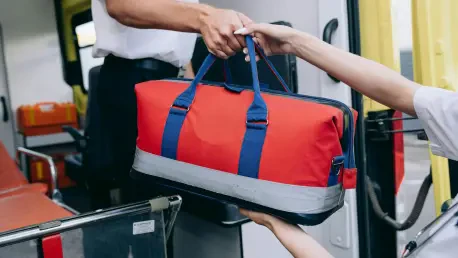A small town in the shadow of environmental history, Libby, Montana, has been dealing with asbestos contamination’s relentless grip. The crisis began due to the operations of a sprawling vermiculite mine beginning in the 20th century, and now Libby faces dire health consequences traced back to asbestos exposure. This situation came to light after an investigation by the Seattle Post-Intelligencer in 1999. Since then, a grim realization has unfolded regarding the asbestos-tainted environment surrounding Libby, leading to an estimated 694 deaths attributed to asbestos from 1979 to 2011. Meanwhile, 10 percent of Libby’s population of 3,200 suffer from asbestos-related illnesses. The U.S. Environmental Protection Agency responded to this escalating health crisis by designating parts of Libby as a Superfund site, focusing resources on what was declared a public health emergency in 2009.
Rise of the CARD Clinic
In response to Libby’s asbestos crisis, the Center for Asbestos Related Disease (CARD) clinic emerged as a beacon of specialized healthcare. Born from the epidemic, CARD has been fundamental in diagnosing and managing asbestos-related diseases through lung screenings and assessments. Over the years, the nonprofit entity has screened over 8,900 individuals, continually emphasizing that symptoms often take decades to surface. CARD’s indispensable role in healthcare provision cannot be overstated. It became a point of reference for patients navigating the long and arduous path of asbestos-related complications. Operating primarily through federal funding, CARD’s reliance on government structures stands testament to its pivotal position in addressing this localized catastrophe. This dependency, however, has introduced vulnerabilities that have shaken its foundation.
Legal Battles and Financial Predicaments
The CARD clinic now faces two insurmountable hurdles threatening its survival. The first emerges from a legal struggle with BNSF Railway, which accused the clinic of fraudulently diagnosing patients to secure Medicare benefits, leveraging the False Claims Act. A court ruling allowing BNSF to seize CARD’s assets was enacted following a lawsuit over a nearly $6 million judgment. This ruling led to CARD’s temporary closure, thrusting its operations into uncertainty. The clinic’s leaders strongly challenge this ruling, appealing the decision and striving to reclaim their assets. During this tumultuous legal joust, CARD’s existence hangs precariously as it battles to maintain its authority in providing essential diagnostic services to the Libby community amidst ongoing litigations.
Federal Funding Concerns
On the financial front, CARD’s situation becomes increasingly precarious. The clinic operates with an annual $3 million grant accounting for 80% of its budget. The Trump administration earmarked this grant for potential cuts, adding fuel to the clinic’s anxiety despite temporary reprieves. This federal support was initially realized through provisions in the Affordable Care Act that tailored Medicare benefits to Libby’s asbestos-affected population and earmarked funds for relevant diagnostics. The withdrawal of fiscal support, combined with legal setbacks, presents an existential threat to CARD clinic’s future. The looming loss of essential financial resources would permanently close the clinic’s doors, consequently denying locals access to crucial diagnostic and medical services.
Impact on Libby Community
The ramifications of these multifaceted challenges resonate deeply with Libby’s residents. Individuals like Gayla Benefield, whose life has been profoundly influenced by the vermiculite mining legacy, highlight this anxiety. Diagnosed with asbestosis, a debilitating respiratory condition, Benefield’s simple story typifies the experiences of many affected by asbestos exposure in Libby. The community’s fears revolve around losing CARD’s specialized healthcare services. While alternative healthcare solutions are scarce, experts like Dr. Robert Kratzke emphasize the indispensable nature of CARD’s expertise, which cannot easily be replicated elsewhere. Residents express apprehension about finding equivalent healthcare support if CARD cannot resume its operations.
Navigating the Crisis
The CARD clinic stands at a crucial crossroad, persistently facing threats that shape Libby’s future and the wider implications of industrial responsibility. Legal and financial barriers compound the urgency surrounding CARD’s capacity to deliver essential healthcare services. The dispute brought forth by BNSF Railway forces introspection about corporate accountability amidst public health emergencies. Attorney Tim Bechtold’s remarks elucidate the paradox inherent in the current litigation scenario, highlighting that BNSF’s liability for asbestos dissemination conflicts with their legal pursuit against CARD. Entangled in broader dialogues of healthcare accessibility, environmental justice, and corporate responsibility, CARD’s journey exemplifies the layered complexity at play.
Looking Forward
The CARD clinic is currently grappling with two significant challenges that threaten its continued existence. The primary issue revolves around a legal dispute with BNSF Railway. BNSF has accused the clinic of fraudulently diagnosing patients in order to obtain Medicare benefits, using the False Claims Act as a basis for the accusation. This has led to a damaging court ruling that allowed BNSF to seize nearly $6 million in CARD’s assets. As a consequence, the clinic faced a temporary closure, leaving its operations in a state of uncertainty. The leaders at CARD are vehemently disputing this ruling, taking steps to appeal the decision in a bid to recover their assets. Meanwhile, the clinic remains embroiled in a difficult legal battle, struggling to maintain its pivotal role in offering vital diagnostic services to the community of Libby. This ongoing litigation places CARD in a fragile position as it strives to preserve both its reputation and essential services amidst an uncertain future.









